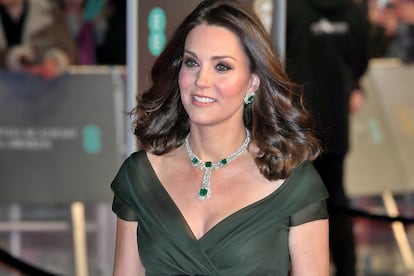The error that lays bare the vulnerability of the British royal family
The palace’s decisions over communicating the nature of Kate Middleton’s illness are testing the fabric of the institution

The Emperor’s New Clothes, Hans Christian Andersen’s 19th-century fable, contains a moral that never loses its relevance: something is not necessarily true simply because everyone believes that it is. It also teaches us that there are no stupid questions. The warnings of Andersen’s tale resonate more than ever at Buckingham Palace, the official residence of the king of the United Kingdom and spiritual temple of the British monarchy. In September 2022, when Charles Mountbatten-Windsor was proclaimed Charles III, public opinion unanimously celebrated the accession to the throne of a 74-year-old who had been waiting more than half a century for his moment. Today, a year and a half later, the people are wondering if their king is not naked.
Charles III has withdrawn from public life for cancer treatment; his wife, Queen Camilla, has had to take a week’s vacation due to exhaustion; Princess Kate is on medical leave after a mysterious abdominal procedure; Prince William, heir to the throne, has reduced his official engagements to accompany his convalescing wife; Prince Andrew has disappeared from the institutional agenda after the Epstein scandal; Prince Harry has stepped back from the royal family and lives in California. People are asking: who is at the helm of the institution, one of the pillars of the United Kingdom?
Never before has the British public seen its monarchy so disrobed and vulnerable. The speculation surrounding Kate Middleton, the Princess of Wales, is probably most testing the seams of the invisible suit that dresses the institution. On January 16, the princess underwent planned abdominal surgery, spent two weeks convalescing in hospital, and has since disappeared from the public eye. Her absence suggests the diagnosis is serious, but no one has clarified what is wrong with her. “She hopes that the public will understand her desire to maintain as much normality for her children as possible; and her wish that her personal medical information remains private,” Kensington Palace — the official residence and name given to the office handling the affairs of the Prince and Princess of Wales — explained in a statement. But citizens have not understood.
Speculation about the princess’s health has been rife for weeks, forcing her to make a series of appearances. The first was a week ago, when she allowed herself to be photographed in the passenger seat of a car driven by her mother around Windsor Castle. The second came this weekend, when she posted a photograph surrounded by her three children on social media. The fact the image was quickly spotted to have been manipulated only served to fuel conspiracy theories about the seriousness of her ailment. The Princess of Wales was forced to apologize. “Like many amateur photographers, I do occasionally experiment with editing. I wanted to express my apologies for any confusion the family photograph we shared yesterday caused,” she said. A few hours later, she was seen leaving Windsor in another car, accompanied by her husband.
Management of the Princess of Wales’s medical procedure and convalescence have plunged the British monarchy into a crisis of public image and credibility. The case has exposed the communication problems of the royal family and has reopened the eternal debate over privacy and transparency, a recurring dilemma for the British royal family. The Windsors reign in a country where tabloid newspapers wield enormous power and influence and in the past these have generated genuine constitutional and political crises, shaking the institution with compromising photos of Lady Diana or Sarah Ferguson, and intimate recordings of the now King Charles and Queen Camilla.
This is the first time that Kate Middleton, dubbed by the U.K. press as “the jewel in the crown,” has become a real problem for the British monarchy. A poll conducted by Sky News in May 2023 placed her as the second most-popular and most-liked member of the royal family, behind only Prince William. Fifty-nine percent of respondents rated her “very favorable” or “mostly favorable,” well ahead of King Charles and Queen Camilla. Today, a year after that poll, she has become an Achilles heel for the Crown.
But the future queen of the United Kingdom has been dealing with media pressure, public scrutiny, and criticism for more than two decades. Middleton ceased to be an unknown on March 26, 2002, when she took part in a University of St. Andrews parade to benefit the victims of the World Trade Center terrorist attacks. “Wow!” exclaimed Prince William to his friend Fergus Boyd when he saw her. That day, Kate lost her anonymity.
The aristocratic and upper-class circles in which the prince moved considered Middleton, born into an upper-middle-class family, not good enough for the future heir to the throne. Some of William’s friends called her “Middle Class Kate,” joked that her mother, Carole Middleton, had worked as a British Airways stewardess, and laughed at the way she spoke. In 2007, Kate used the word “toilet” instead of “loo,” the way aristocrats usually refer to the bathroom. The toffs — the wealthy English upper-class — leaked the anecdote to the press, which christened the affair Toiletgate.
They say Middleton never let it get to her. She also stoically withstood the media pressure. In 2004, when her courtship with the prince was already official, journalists incessantly asked a 22-year-old William if he had wedding plans. The young man would reply in horror that he didn’t want to get married until he was 28 or 30. The media then dubbed his future bride “Waity Katie.” Later, when she quit her job at clothing retail chain Jigsaw to prepare for her life in the royal family, they called her “Lazy Katie.”
Unlike her sister-in-law, Meghan Markle, Middleton has quietly endured the vexations of her country’s tabloid press. After eight years of dating, in 2010 she became engaged to the prince and in 2011 they were married. Since then, she has earned her popularity, becoming a key player in the British monarchy. The question now is whether she will come out of this controversy that has increased the sense of turbulence surrounding the Crown.
Sign up for our weekly newsletter to get more English-language news coverage from EL PAÍS USA Edition
Tu suscripción se está usando en otro dispositivo
¿Quieres añadir otro usuario a tu suscripción?
Si continúas leyendo en este dispositivo, no se podrá leer en el otro.
FlechaTu suscripción se está usando en otro dispositivo y solo puedes acceder a EL PAÍS desde un dispositivo a la vez.
Si quieres compartir tu cuenta, cambia tu suscripción a la modalidad Premium, así podrás añadir otro usuario. Cada uno accederá con su propia cuenta de email, lo que os permitirá personalizar vuestra experiencia en EL PAÍS.
¿Tienes una suscripción de empresa? Accede aquí para contratar más cuentas.
En el caso de no saber quién está usando tu cuenta, te recomendamos cambiar tu contraseña aquí.
Si decides continuar compartiendo tu cuenta, este mensaje se mostrará en tu dispositivo y en el de la otra persona que está usando tu cuenta de forma indefinida, afectando a tu experiencia de lectura. Puedes consultar aquí los términos y condiciones de la suscripción digital.









































